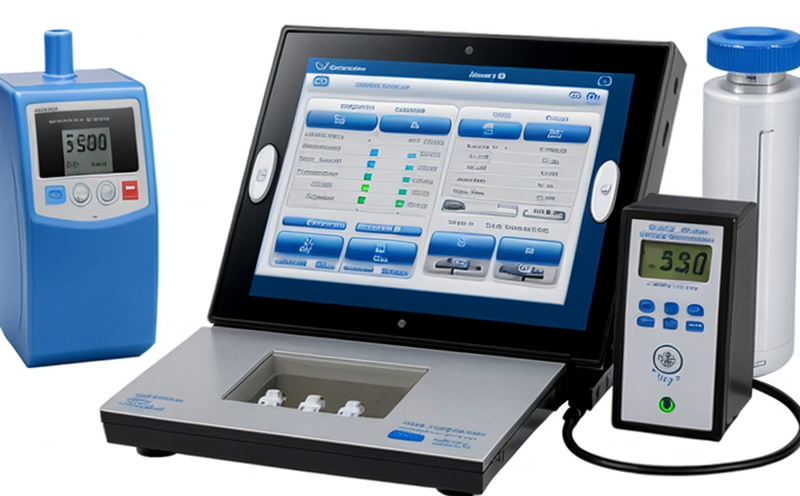ISO 11608-6 Connectivity and Data Security Testing for Drug Delivery Systems
The International Organization for Standardization (ISO) has established stringent requirements to ensure that drug delivery systems, including infusion pumps, are safe, effective, and secure in their connectivity and data handling. The ISO 11608 series of standards is particularly focused on the biocompatibility aspects of medical devices but also includes specific sections addressing connectivity and data security.
ISO 11608-6 specifically deals with the connectivity and data security requirements for drug delivery systems, ensuring that these devices can communicate securely over networks without compromising patient safety or privacy. This standard is critical in today's digital healthcare environment where connected medical devices play a crucial role in modern treatment protocols.
The testing outlined in ISO 11608-6 aims to protect patients from potential risks associated with unauthorized access, data breaches, and system vulnerabilities. It ensures that the communication between the infusion pump and external systems (such as hospital networks or cloud-based platforms) is secure and reliable. This includes robust encryption methods for data transmission, authentication protocols, and measures against unauthorized access.
The testing process involves several key steps to ensure compliance with ISO 11608-6 standards:
- Network configuration analysis
- Data integrity checks
- Cryptography validation
- Authentication protocol verification
- Vulnerability scanning and mitigation
- Compliance with relevant international standards such as ISO/IEC 27001 for information security management systems
These tests are essential to ensure that drug delivery systems meet the highest safety and security standards, which is critical in a sector where patient lives depend on the correct function of these devices.
The testing ensures that medical professionals can rely on the accuracy and reliability of their equipment. For instance, an infusion pump connected via Bluetooth or Wi-Fi must transmit data securely to avoid risks such as tampering with dosing schedules or unauthorized changes in treatment protocols. This testing also helps manufacturers comply with regulatory requirements, ensuring they meet not only ISO 11608-6 but also other relevant standards like IEC 62304 for software lifecycle management.
In summary, the ISO 11608-6 standard is crucial in safeguarding patient safety and privacy while maintaining the integrity of drug delivery systems. Compliance with this standard ensures that medical devices are secure, reliable, and capable of functioning correctly within networked environments.
Benefits
Compliance with ISO 11608-6 connectivity and data security testing brings numerous benefits to the manufacturer and end-users:
- Enhanced Patient Safety: Ensures that patient data is protected from unauthorized access, reducing risks of errors or misuse.
- Regulatory Compliance: Helps manufacturers meet global regulatory requirements and avoid costly non-compliance penalties.
- Increased Market Confidence: Builds trust with healthcare providers and patients regarding the reliability and security of medical devices.
- Improved Device Performance: Ensures that connectivity and data handling are optimized, enhancing overall device performance.
- Reduced Liability Risks: Minimizes legal risks associated with potential breaches or malfunctions in connected systems.
The testing process not only ensures compliance but also provides a competitive edge by differentiating products in the market as being state-of-the-art and secure. This is particularly important for medical device manufacturers aiming to meet the growing demand for digital health solutions that are both safe and reliable.
Industry Applications
The ISO 11608-6 standard finds application in a wide range of medical devices, with a particular focus on drug delivery systems. These include:
- Intravenous Infusion Pumps: Ensuring secure data transmission during infusion therapy.
- Syringe Drivers: Providing reliable and secure communication for long-term pain management solutions.
- Pain Management Systems: Guaranteeing the integrity of dosing protocols in chronic pain treatment.
- Dialysis Machines: Ensuring that patient data is securely transmitted during dialysis sessions.
The standard's emphasis on secure connectivity and data handling makes it essential for any medical device that relies on networked communication or external data sources. By adhering to these standards, manufacturers can ensure their devices are not only compliant but also meet the highest safety and security benchmarks in the industry.
Competitive Advantage and Market Impact
- Enhanced Reputation: Compliance with ISO 11608-6 enhances a manufacturer's reputation by demonstrating commitment to patient safety and security.
- Innovation Leadership: Adhering to the latest standards allows manufacturers to stay ahead of competitors, offering more secure and reliable products.
- Better Patient Trust: By ensuring that their devices are secure and reliable, manufacturers build stronger trust with healthcare providers and patients.
- Increased Market Share: Compliance with ISO 11608-6 can lead to increased market share as consumers and healthcare professionals seek out products they can trust.
The impact of ISO 11608-6 on the medical device industry is profound, driving innovation and ensuring that patients receive safe and secure treatment. Compliance with this standard not only meets regulatory requirements but also sets a new benchmark for excellence in drug delivery systems.





